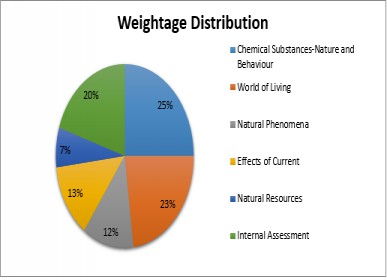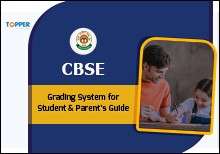How to Score Full Marks in CBSE Class 10 Science

A detailed report of the CBSE Class 10 Science paper to help you get more marks in the board exams
By 23rd Feb, 2018 | 06:44 pm
ShareScience plays an important role in life. While Science or General Science is still a common subject, the disciplines of Physics, Chemistry and Biology have now emerged. Encompassing these disciplines, the Science syllabus for CBSE Class 10 has been designed around seven broad themes, viz. Food; Materials; The World of the Living; How Things Work; Moving Things, People and Ideas; Natural Phenomenon and Natural Resources.
The Class 10 Science board exams on 16th March 2018. There’s not even a month left. Nervous, confused or scared?
There is a belief that one cannot score full marks in Science; however, an increasing number of students have been able to score 100 in this subject. Yes! Scoring a high percentage of marks is not difficult. You just require the right study strategies and correct understanding of the concepts.
And well, you certainly don’t need to be nervous or confused, because we at TopperLearning are here to help you. You can also always go through past year papers or sample papers to get acquainted with the paper pattern.
CBSE Class 10 Science Exam Paper Pattern
In the new scheme of examination, CCE and the term system have been replaced with a single annual exam by CBSE. Your exam is conducted by CBSE for 80 marks, and 20 marks are for internal assessments at school.
The table below gives you detailed guidelines, as issued by CBSE on how the internal marks will be divided among different activities.
|
80 Marks (Board Examination) Student has to secure |
20 Marks (Internal Assessment) Student has to secure 33% marks out of overall 20 marks earmarked in each subject. |
|||
|
Periodic Assessment (10 Marks) |
Practical / Laboratory work |
Portfolio |
||
|
Periodic Tests (5 Marks) |
Short tests, oral test, quiz, concept map (5 Marks) |
|||
CBSE Class 10 Science Weightage of Chapters
There is less time for the board exam and everyone wants good marks and to see their names on the merit list. But the real challenge is knowing what kind of questions will appear in the board exam. Below is the official blueprint of CBSE Class 10.
- While preparing for your exam, it is important that one knows the weightage of each chapter, this will help you bifurcate your preparation time between chapters based on their weightage.
- Below is the official blueprint by CBSE for the chapter wise weightage.
|
Unit |
Title |
Weightage |
|
1 |
Chemical Substances-Nature and Behaviour |
25 |
|
2 |
World of Living |
23 |
|
3 |
Natural Phenomena |
12 |
|
4 |
Effects of Current |
13 |
|
5 |
Natural Resources |
07 |
|
Total Marks |
80 |
|
|
Internal Assessment |
20 |
|
|
Grand Total |
100 |

3. Question Paper Design
- Being well versed with the typology of questions and the question weightage of marks is essential.
- Below is the official blueprint by CBSE for the typology of questions along with the weightage of marks.
|
Sr. No |
Typology of Questions |
Objective Type * (01 mark) |
SA (03 marks) |
LA (05 marks) |
Weightage |
|
1 |
Remembering |
07 |
02 |
01 |
22.5% |
|
2 |
Understanding |
04 |
02 |
02 |
25% |
|
3 |
Applying |
04 |
01 |
02 |
21.25% |
|
4 |
Analyzing and Evaluating |
05 |
02 |
01 |
20% |
|
5 |
Creating |
- |
03 |
- |
11.25% |
|
|
Total |
20 (20) |
10 (30) |
06 (30) |
100% |
Key points
(i) The Science question paper comprises a total of 36 questions: 20 (1 mark), 10 (3 marks), and 6 (5 marks).
(ii) Internal choice of approximately 33% would be provided.
(iii)Objective Section would have 10 MCQ. Besides this, the section would include VSA, Assertion-Reasoning type questions, etc.
(iv)3 marks question needs to be answered in about 50 words.
(v) 5 marks question needs to be answered in about 70 words.
(vi)The theory exam of the Science paper will carry a total of 80 marks, and candidates will be allowed 3 hours to attempt it.
(vii) Candidates must be very particular about diagrams and labelling.
Important Chapters/Topics to be covered
Below are the important topics that one must cover to be thorough with the chapter.
|
Chapter |
Topic |
|
Chemical Reactions and Equations |
1. Chemical equations (Writing and balancing) 2. Different types of chemical reactions |
|
Acids, Bases and Salts |
1. Reactions of acids and bases 2. Reaction of oxides with acids and bases 3. Different types of salts |
|
Metals and Non-metals |
1. Chemical properties of metals (special reference to reactions with air and water) 2. Properties of ionic compounds 3. Extraction of metals based on the activity series |
|
Carbon and its Compounds |
1. Different allotropes of carbon (only SA questions) 2. Nomenclature of organic compounds 3. Addition reaction and substitution reaction 4. Properties of ethanol and ethanoic acid 5. Formation of soaps and detergents |
|
Periodic Classification of Elements |
1. Mendeleev’s periodic table 2. Properties of modern periodic table |
|
Life Processes |
1. Mode of nutrition (with special reference to autotrophic nutrition) 2. Human digestive system 3. Human respiratory system 4. Function of human heart 5. Formation of urine |
|
Control and Coordination |
1. Reflex action 2. Function of human brain 3. Hormones in animals |
|
How Do Organisms Reproduce? |
1. Differences between various modes of asexual reproduction 2. Double fertilisation 3. Male reproductive system 4. Fertilisation in females |
|
Heredity and Evolution |
1. Mendel’s Laws 2. Law of independent assortment 3. Homologous and analogous organs 4. Evolution of wild cabbage |
|
Light: Reflection and Refraction |
1.Image formation by spherical mirrors due to reflection 2. Image formation by spherical lens due to refraction 3. Sign convention for reflection by spherical mirrors and for refraction by spherical lens 4. Mirror and lens formula along with magnification for both the cases |
|
The Human Eye and the Colourful World |
1. The parts and working of a human eye 2. Power of accommodation for human eye 3. Defects of human eye along with their corrective measures 4. Dispersion of white light passing through the triangular prism 5. Atmospheric refraction and scattering 6. Tyndall effect |
|
Electricity |
1. Ohm’s law 2. Resistance, factors on which it depends, resistivity 3. Effective resistance of the resistors connected in series and parallel combination 4. Joule’s law of heating and electric power |
|
Magnetic Effects of Electric Current |
1. Magnetic field due to various current carrying conductors 2. Right hand thumb rule and left hand rule 3.Magnetic force due to current-carrying conductors and electric motor 4.Electromagnetic induction and electric generator 5. Domestic electric circuits
|
|
Sources of Energy |
1.Conventional and non-conventional sources of energy |
|
Our Environment |
1. Significance of food chain and food web 2. Energy flow (10%) |
|
Management of Natural Resources |
1. 3Rs to save the environment 2. Different stakeholders 3. Method of water harvesting |
Preparation Tips for your CBSE Class 10 Science Paper
Our preparation tips is covered under three essential heads:
a) Study tips
b) General tips
c) Tips for attempting the paper
a) Study tips
Academic experts have worked consistently in analysing your syllabus, chapters and topics as well as your paper pattern and have summarised the following few essential pointers that one must follow while preparing for their Science paper.
- Your paper comprises both Objective/MCQ based questions and as well as subjective based questions. While attempting these questions, the following points must be kept in mind for each subject.
A) Subjective Questions (60 Marks):
(a) Physics
- Understand the sign conventions and rules for drawing ray diagrams.
- Note down the important formulae and equations and memorise them to solve numerical problems.
- Practice the numerical questions and revise the concepts as this is the key to ace Physics.
- Speed with accuracy in solving problems can only be acquired through in-depth study of the subject and extensive practice.
(b) Chemistry
- Practise the balancing of chemical equations.
- Questions on modern periodic table and reactivity series cannot be missed. So study the Periodic Classification chapter really well (3 marks).
- Study the preparation of different types of salts (any one salt preparation with the chemical formula etc. is a sure-shot question of 3 marks).
- pH-related questions may be optional based.
- Questions on alloys and corrosion are likely to be asked.
(c) Biology
- Practise the diagrams (to name a few: asexual reproduction, male and female reproductive systems, human heart, human excretory system, double circulation) – wherever necessary.
- Solve the Mendel’s heredity crosses with stress on the laws of Mendel (3 marks).
- Remember the concepts on ‘Food Chain’, ‘Significance of Food Chain’, and ‘10% Law ’, ‘Evolution of Cabbage ’,‘ Water Harvesting Technique and Different stakeholders’.
- Long answer questions on ‘Life Processes’ (any human system should not be missed out).
B) Objective questions (20 marks):
- For Biology, questions will mostly be from reproduction through asexual mode (amoeba, yeast), different parts of an embryo, homologous and analogous organs.
- For Chemistry, questions on identification of types of reactions, pH level, reactions with metals and non-metals.
- For Physics, questions on equivalent resistance, focal length of convex and concave lenses, determination of focal length, a numerical on image distance and drawing ray diagrams.
General Tips to Follow for CBSE Class 10 Science Exam:
a) If you’re studying Science on a particular day, divide the time for at least two subjects –Physics/Chemistry, Chemistry/Biology or Physics/Biology.
b) Take chapters which are easy to remember and finish them on time (as suggested for preparation tips from the flowcharts).
c) Follow an easy–difficult combination of studying.
d) Important topics suggested should be studied with utmost concentration.
e) After you study a chapter, make a habit of jotting down some important points. This will help in remembering the concept and improve handwriting.
f) Draw diagrams when you get tired of reading a concept.
g) Eat, sleep, study and relax – the ultimate way to score good marks.
h) Do not stay awake till late at night before the day of the exam.
Tips while attempting the Science Question Paper
- Read the question paper first.
- Start and continue with any one pen while starting the answer. Do not change the ink.
- Answer questions which you know and are comfortable in answering FIRST.
- Follow bullets/steps while answering any question.
- Good handwriting and neatly written answers help a lot.
- Answers should always be concise and precise, with a good introduction and conclusion.
- For 5-mark questions, try to divide the answers in any way that you can so that it would be easy for the examiner to have a good impression.
- Keep a watch over time while writing answers because you have to attempt 36 questions in three hours.
- Do not spend too much time on one question.
- Review all answers in the last 10 minutes.
- Diagrams should be drawn with a pencil. Do not use a pen.
How to Prepare for CBSE Class 10 Science (TopperLearning Flow)
CBSE Class 10 Science studytips to Follow:
a) If you’re studying Science on a particular day, divide the time for at least two subjects – Physics/Chemistry, Chemistry/Biology or Physics/Biology.
b) Take chapters which are easy for you to remember and finish them on time (as suggested for preparation tips from the flowcharts).
c) For example, if you are taking the combination Biology/Chemistry or vice versa, study the ‘Our Environment’ chapter and ‘Chemical Reactions’ and note down the typology of questions. Then start studying the ‘Life Processes’ chapter and ‘Carbon and its Compounds’.
d) Follow an easy–difficult combination of studying.
e) Important topics suggested should be studied with utmost concentration.
f) After you study a chapter, make a habit of jotting down some important points. This will help in remembering the concept and improve handwriting.
g) Draw diagrams when you get tired of reading a concept.
h) Eat, sleep, study and relax – the ultimate way to score good marks.
i) Do not stay awake till late at night before the day of the exam.
Why TopperLearning?
Sample Papers will help you gain confidence and make you ready to face the examinations. These papers cover important concepts from an examination perspective. Model solutions are also provided to help self-evaluation.
- Understand the marking scheme according to the new curriculum
- Questions and solutions are prepared by our experts
Board papers familiarise students with the pattern of the board paper and the marking scheme. Solved board papers give an added advantage by providing students an understanding of the answers expected for the questions in a paper. These papers are the best revision tools and must be made an integral part of your exam preparation.
Most Important Questions (MIQ) help prepare you with sure-shot questions which you can practise. To make you more used to the questions, the solutions are not posted by our experts. You can post those questions which you cannot answer on ‘Doubts and Solutions’ so that our experts will get your query solved on the same day.
Ask Your Doubts with Live Exam Help is a platform to help you to score well by clearing all your doubts and queries for a particular topic mentioned in the syllabus.
Also Read
How to Score above 90 in Social Science CBSE Class 10 board Exam
How to score full marks in CBSE Class 10 Hindi
Important Resources
- Education Franchisee opportunity
- NCERT Solution
- CBSE Class 9 Mathematics
- NCERT Solutions for class 10 Science
- Sample Papers
- CBSE Class 9 Science
- NCERT Solutions for class 10 Maths
- Revision Notes
- CBSE Class 10 Hindi
- CBSE Class 10 English
- CBSE Class 10 English
- CBSE Class 10 Social Studies
- CBSE Class 10 Science
- CBSE Class 10 Mathematics
- Career In Science After 10
- Career In Commerce After 10
- Career In Humanities/Arts After 10
- NCERT Solutions for Class 10
- NCERT Solutions for Class 11
- Business Studies Class 12 CBSE project






